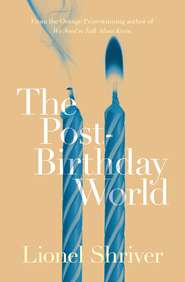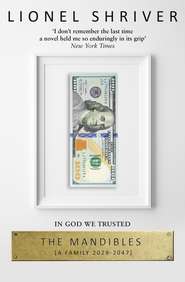По всем вопросам обращайтесь на: info@litportal.ru
(©) 2003-2024.
✖
The Self-Seeding Sycamore: A Short Story from the collection, Reader, I Married Him
Автор
Год написания книги
2018
Настройки чтения
Размер шрифта
Высота строк
Поля
Lionel Shriver
A short story by Lionel Shriver from the collection Reader, I Married Him: Stories inspired by Jane Eyre.In ‘The Self-Seeding Sycamore’, a widow wages war upon her neighbour’s garden, and makes a surprising discovery.Edited by Tracy Chevalier, the full collection, Reader I Married Him, brings together some of the finest and most creative voices in fiction today, to celebrate and salute the strength and lasting relevance of Charlotte Brontë’s game-changing novel and its beloved narrator.
The Self-Seeding Sycamore
Lionel Shriver
A short story from the collection
Copyright (#ulink_73fad83c-f8e6-5d6a-8764-2c8119856e2c)
Published by The Borough Press
An imprint of HarperCollinsPublishers Ltd
1 London Bridge Street
London SE1 9GF
www.harpercollins.co.uk (http://www.harpercollins.co.uk)
First published in Great Britain by HarperCollinsPublishers 2016
Foreword © Tracy Chevalier 2016
The Self-Seeding Sycamore © Lionel Shriver 2016
The moral rights of the authors have been asserted
Cover design by Heike Schüssler © HarperCollinsPublishers Ltd 2016
Jacket photograph © Dan Saelinger/Trunk Archive
A catalogue copy of this book is available from the British Library.
This story is entirely a work of fiction. The names, characters and incidents portrayed in it, while at times based on historical events and figures, are the works of the authors’ imaginations.
All rights reserved under International and Pan-American Copyright Conventions. By payment of the required fees, you have been granted the non-exclusive, non-transferable right to access and read the text of this e-book on-screen. No part of this text may be reproduced, transmitted, down-loaded, decompiled, reverse engineered, or stored in or introduced into any information storage and retrieval system, in any form or by any means, whether electronic or mechanical, now known or hereinafter invented, without the express written permission of HarperCollins.
Source ISBN: 9780008150594
Ebook Edition © April 2016 ISBN: 9780008173494
Version: 2016-03-16
Contents
Cover (#u25cf6250-2cd1-59da-bd2f-d25b3cd87bb8)
Title Page (#u3054ba5b-5431-5a11-b187-9bfd2b517ed8)
Copyright (#ufde37ba0-0096-5167-a099-2ece9ea1f455)
Foreword by Tracy Chevalier (#ue30a5137-e06d-59ab-978d-1ba990c80e5c)
The Self-Seeding Sycamore – Lionel Shriver (#u84b30063-aa45-5e27-9a2f-b9f5f4ae4a20)
Author Note (#litres_trial_promo)
A Note on Charlotte Brontë (#litres_trial_promo)
About the Publisher (#litres_trial_promo)
FOREWORD BY (#ulink_7bdc63b0-41ae-5985-a49a-5ab62d2e6069)TRACY CHEVALIER (#ulink_7bdc63b0-41ae-5985-a49a-5ab62d2e6069)
Why is Charlotte Brontë’s “Reader, I married him” one of the most famous lines in literature? Why do we remember it and quote it so much?
Jane Eyre is “poor, obscure, plain, and little”, with no family and no prospects; the embodiment of the underdog who ultimately triumphs. And “Reader, I married him” is Jane’s defiant conclusion to her rollercoaster story. It is not, “Reader, he married me” – as you would expect in a Victorian society where women were supposed to be passive; or even, “Reader, we married.” Instead Jane asserts herself; she is the driving force of her narrative, and it is she who chooses to be with Rochester. Her self-determination is not only very appealing; it also serves to undercut the potential over-sweetness of a classic happy ending where the heroine gets her man. The mouse roars, and we pump our fist with her.
Twenty-one writers, then, have taken up this line and written what it has urged them to write. I liken it to a stone thrown into a pond, with its resulting ripples. Always, always in these stories there is love – whether it is the first spark or the last dying embers – in its many heart-breaking, life-affirming forms.
All of these stories have their own memorable lines, their own truths, their own happy or wry or devastating endings, but each is one of the ripples that finds its centre in Jane and Charlotte’s decisive clarion call: Reader, I married him.
Tracy Chevalier
THE SELF-SEEDING (#ulink_603313dd-4435-5310-b50f-7b2676f09597)SYCAMORE (#ulink_603313dd-4435-5310-b50f-7b2676f09597)
LIONEL SHRIVER (#ulink_603313dd-4435-5310-b50f-7b2676f09597)
JEANNETTE HAD NO IDEA that plants could engender so much hatred.
For years, she’d left the garden to Wyndham. Weekends outdoors provided an antidote to the windowless stasis of his lab. Though their plot was sizable only by London standards, she’d humoured him. (Whatever was there to do? A little watering during dry spells, a ten-minute run of the hand mower round the lawn.) Having begrudged the dear man neither his solitude nor his superfluous pottering, she treasured snapshots of her husband in muddied khaki trousers, bent over a bed, doing heaven-knew-what with a characteristically intent expression. Now, of course, she knew exactly what he’d been doing. How much he’d spared her.
While still cosseted by mutual spousal existence, she’d scanned with indifference bitter first-person articles about how fiercely people avoid the bereaved – a revelation her own friends had amply illustrated for a year or more. She didn’t blame them. Unintentionally, she and Wyndham had fallen into the heedlessly hermetic unit of two that’s so off-putting from the outside. If she didn’t need friends then, she’d no right to demand their solicitations now. Besides, she’d grown less compelling to herself. A widow of fifty-seven had both too much story left, and not enough. It was narratively awkward: an ellipsis of perhaps thirty years, during which nothing big would happen. Only little things, most of them crap.
The big story that was over wasn’t interesting, either. Pancreatic: swift and dreadful. Yet the pro forma tale did include one poignant detail. Two years ago, she and Wyndham took early retirement, he from private biochemical research, she from her job as a buyer for Debenhams. Some colleagues had quietly disapproved, and soon no one would be allowed to stop working at fifty-five, but to Jeannette and Wyndham that argued for a leap through the closing window. They’d not found each other until their forties, and had made extravagant travel plans for while they were still in rude health. The reasoning was sound; the arithmetic, not. The diagnosis arrived a mere ten weeks after Wyndham’s farewell party.
She hadn’t kept track of whether fifty-seven was the new forty-seven, or thirty-five, or sixty-four – but in any event whatever age she’d reached was not the age she was. Not long ago, she and Wyndham had mourned his every strand that clogged the plughole, each new crease in her neck when she glanced down. Now? She could not get older fast enough.
Convinced that a garden took care of itself – it grew, bloomed, browned and without prodding renewed the cycle – other than hiring a boy to mow, for the year following Wyndham’s death she left the back to its devices. In truth, she missed the sharpness of those first few months, whose high drama would have been impossible to maintain without its sliding into a humiliating fakery, a performance for herself. While still free-flowing and unforced, the grief had been so immersive, so rich and pure and concentrated, with the opacity of Cabernet, that it verged on pleasure. Yet from the start the anguish had been spiked with an awful foreknowledge that the keenness of her loss would blunt, leading to a second loss: a loss of loss. Some soft, muffled bufferedness was bound to take over, as if she were buttressed by excess packaging. Unlike the searing period, with its skipped meals and feverish lie-ins, a bufferedness could last forever, and probably would.
Sure enough, the stab ebbed to ache; a torturous residual presence gave way to absence. Jeannette took refuge in self-sufficiency. She would take nothing (besides that reduced-rate pension), and expect nothing. There must have been millions of such Britons: perfectly neutral social quantities, mutely shopping and tidying up. She would take care of herself, as the garden did.
So late this April, she was surprised to note on an aimless stroll beyond the slug-trailed patio, simply to escape the house – which had never felt suffocating when she shared it – that flowering shrubs past their prime were pooping mounds of rotting pink blossoms, under which matted grass skulked, dying or dead, a urinary yellow. Ineffectually, she raked the piles of petals with her fingers off the moribund lawn, in idle amazement that flowers could kill. The silky mulch had a nice heavy wetness, reminiscent of her cheeks after an inadvisable third glass of wine. Its original perfume mixed with an aroma deader and flatter, like sweet but fading memories intermingling with her present self-sufficiency.
She surveyed the beds on either side. Pooping flowers were the least of it. Unafflicted by Wyndham’s “superfluous” attentions, the ceanothus had bushed out in scraggly extrusions like an unbarbered Afro, blocking the stone path to the tool shed and poking her in the eye. Ivy had choked the herbs; the ferns drooped with snails. Weeds snarled around Wyndham’s languishing plants. The lawn had bare patches from peeing foxes, vermin she’d been too apathetic to shoo. She couldn’t speak for the human sphere, but apparently in the botanical world, without the constant intercession of a benevolent higher power, evil triumphed.
Вы ознакомились с фрагментом книги.
Приобретайте полный текст книги у нашего партнера:
Приобретайте полный текст книги у нашего партнера:











